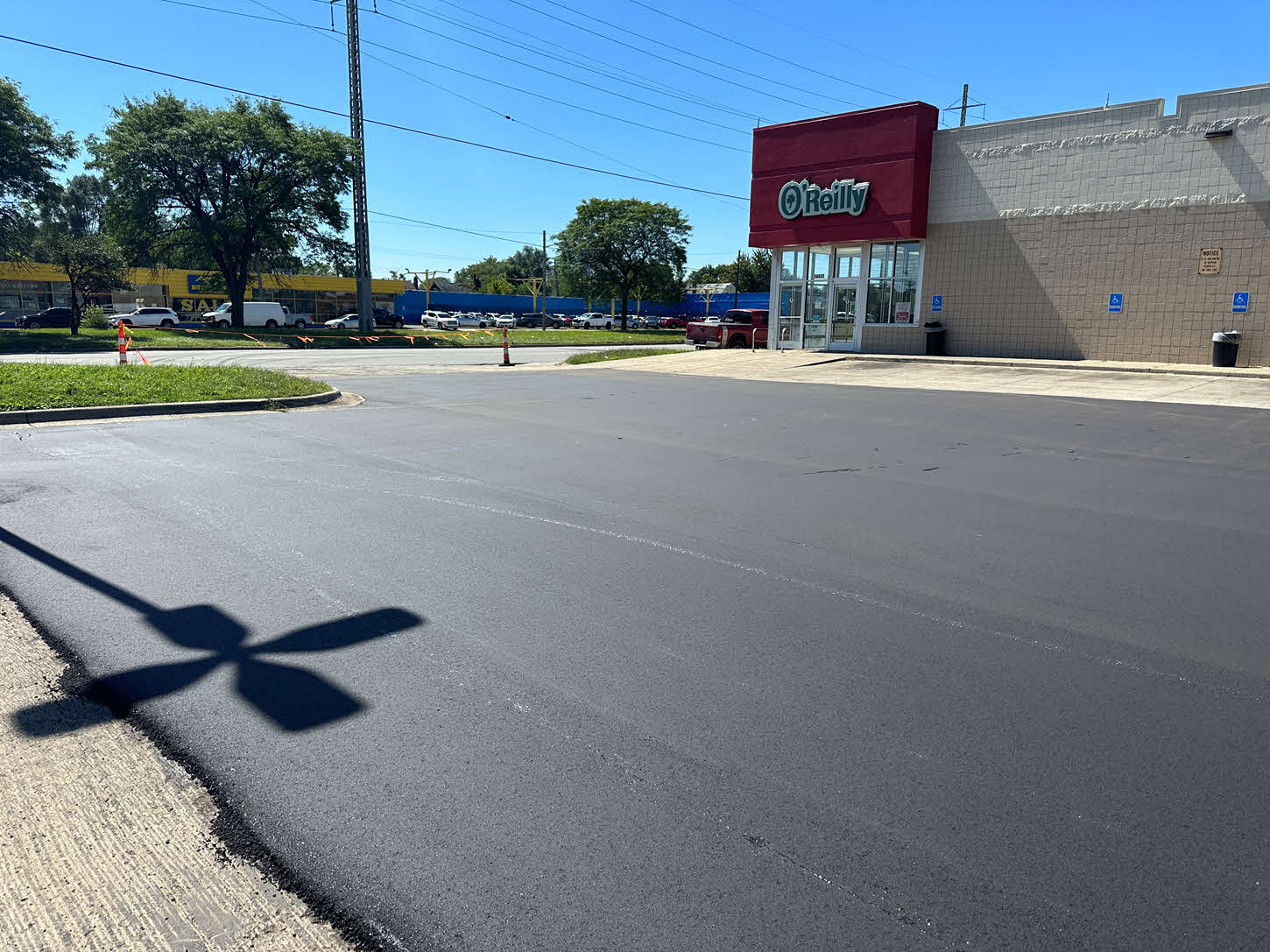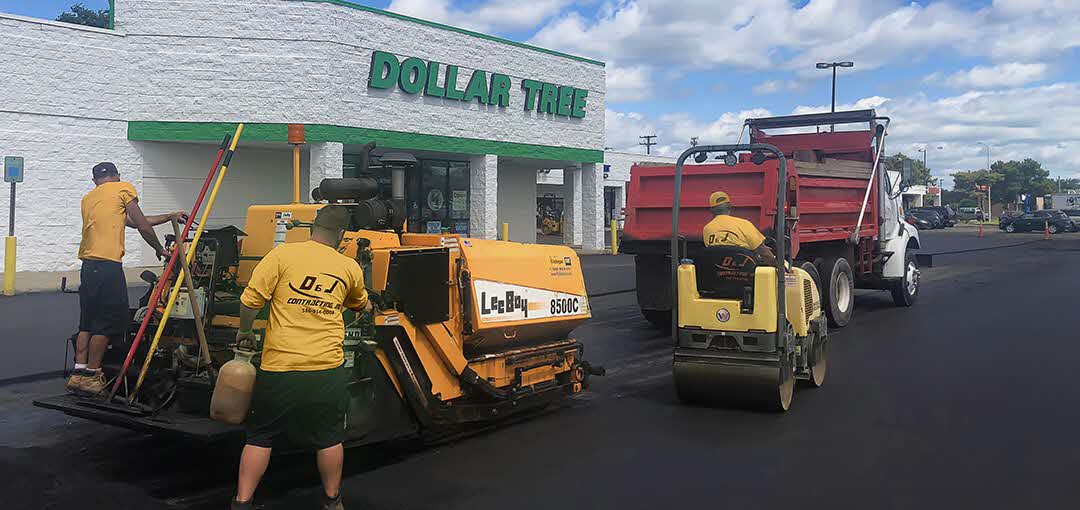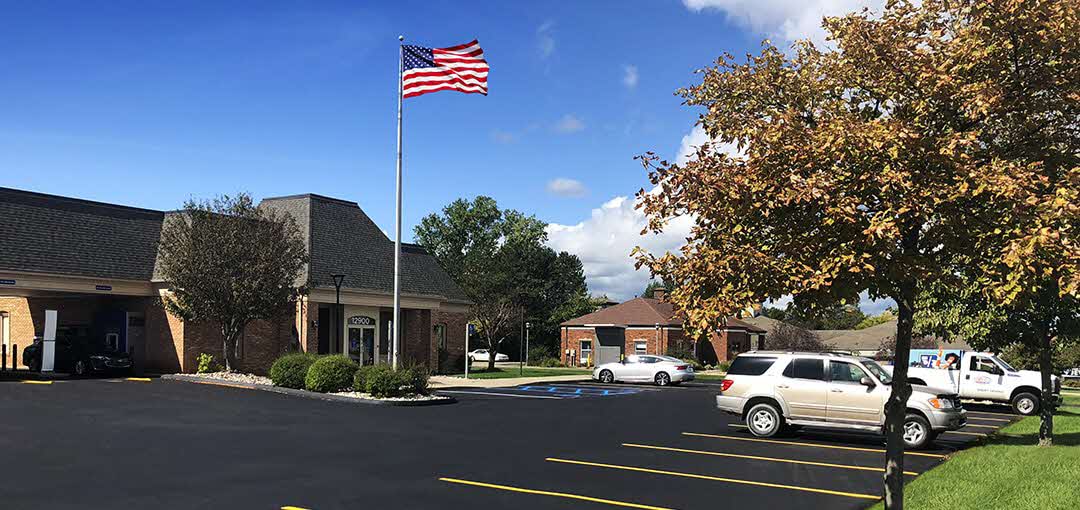Parking Lot Repaving inNew Haven, MI
Professional Parking Lot Repaving for a Fresh, Smooth Finish
We Are Locally Owned & Operated For Over 37 Years
Contact Us Today!
We Serve Businesses In And Around The Following Cities:
About Parking Lot Repaving
Comprehensive Guide to Parking Lot Repaving in New Haven for Commercial Properties
The Importance of Parking Lot Repaving for Commercial Properties
In the bustling urban environment of New Haven, maintaining a commercial property’s curb appeal and functionality is paramount. A critical yet often overlooked aspect of this is the condition of the parking lot. Parking lot repaving is an essential undertaking that significantly influences not only the aesthetic appeal but also the safety and operational efficiency of a business venue. For commercial properties, a well-maintained parking lot reflects the broader care and quality that a business offers, making it an impactful first impression on customers and clients.
The need for parking lot repaving in New Haven becomes more apparent when considering the city’s variable climate and its impact on asphalt surfaces. Over time, weather patterns, combined with the regular wear and tear from vehicles, lead to cracks, potholes, and other forms of deterioration. Such conditions not only diminish the visual appeal of a property but also pose potential safety hazards. For example, customers could trip on uneven surfaces, potentially leading to liability issues for the business. Therefore, timely repaving is not merely a cosmetic improvement; it’s a strategic investment in client safety and business operations.
When looking to undertake repaving, understanding the process and recognizing the paramount benefits it brings can significantly enhance decision-making for commercial property owners. Additionally, selecting a reputable contractor like D&J Contracting can ensure the job is completed with precision and expertise, further enhancing a property’s value and functionality.
The Process of Parking Lot Repaving
The process of parking lot repaving, while fairly straightforward in concept, requires meticulous planning and execution. For commercial properties in New Haven, this typically begins with a thorough assessment of the existing lot. Professionals inspect for signs of distress including cracks, uneven surfaces, and water drainage issues. Such evaluations are crucial as they guide the scope of work needed to restore the parking lot to optimal condition.
Once the initial assessment is complete, the next step is preparing the site for repaving. This involves removing the old, damaged asphalt surface. Specialized machinery is employed to mill down the surface, which ensures a clean and level base for the new layer. In certain situations, issues such as sub-surface drainage concerns may have to be addressed. Proper preparation is key to a long-lasting repave.
After preparation, the focus shifts to laying down new asphalt. The application is a precise operation where the right mix of materials must be used to ensure durability against New Haven’s weather changes. This phase is particularly critical as improper application can lead to premature degradation. Contractors, such as D&J Contracting, employ experienced personnel and advanced techniques to ensure that the new asphalt bonds effectively with the foundation, providing a smooth, enduring surface.
Finally, after the asphalt is laid, the repaving process concludes with finishing touches including line striping for parking spaces and addition of signage as necessary. These elements not only provide functional benefits but also enhance the organizational flow of the parking lot, guiding vehicular and pedestrian traffic safely and efficiently.
Benefits of Repaving Commercial Parking Lots
The decision to repave a commercial parking lot can be motivated by a variety of compelling benefits. Primarily, a freshly paved lot significantly enhances the aesthetic appeal of a commercial property. It serves as a visual statement of quality and attention to detail that can attract customers and set a property apart in the competitive New Haven market.
Moreover, a smooth, well-maintained parking lot can reduce liability risks associated with vehicle damage or customer accidents due to potholes or uneven pavement. Safety remains a top priority for businesses, and addressing these potential hazards through repaving is a proactive approach that protects both the customer and the business alike.
Another substantial benefit lies in the improved functionality of the parking lot. New asphalt not only looks better but also performs better. Proper water drainage is a critical aspect that can be vastly improved with repaving, reducing potential flooding or standing water issues that are prevalent in older, compromised lots. This improvement is particularly significant in areas like New Haven where rainfall patterns necessitate effective draining solutions.
Financially, investing in parking lot repaving offers a considerable return. While the initial parking lot repaving cost may appear daunting, the long-term savings on repairs and the added value to the property can offset these expenses. A repaved lot requires less frequent maintenance and the reduction in potential liability claims or insurance premiums can further bolster these financial benefits.
Real-World Applications and the New Haven Context
In New Haven, where historical charm meets modern commerce, parking lot repaving plays a pivotal role in urban development and sustaining business growth. Commercial properties, whether they are retail centers, office complexes, or hospitality venues, can gain significantly from prioritizing infrastructure enhancements like repaving.
Consider a local shopping center looking to attract more foot traffic. By investing in a repaved parking lot, it can offer customers a clean and safe first point of contact. This not only encourages more visits but can also translate into longer stays and increased sales for businesses within the center. Furthermore, the local regulatory environment encourages developers and property owners to keep their facilities up to date, aligning with broader municipal development goals.
For office complexes in New Haven, where tenant retention is critical, a repaved lot can be a crucial factor in attracting and retaining high-value tenants. Modern businesses look for spaces that reflect their own brand values of professionalism and care. A well-maintained parking lot sends a clear message that the building management pays attention to every detail, including the facilities their tenants’ employees and clients use daily.
Furthermore, hotels and hospitality venues can enhance guest experiences beginning from the point of arrival. The tactile experience of driving into a smooth, well-organized parking area is a subtle yet powerful factor that contributes to overall guest satisfaction, which is integral for maintaining ratings and securing repeat business.
In each of these cases, partnering with experienced contractors like D&J Contracting can streamline the repaving process. With their local knowledge and expertise, they understand the specific challenges that New Haven properties face. They can provide practical solutions tailored to each client’s needs, ensuring that repaving projects are completed efficiently and to the highest standards.
Strategic Considerations for Property Owners
When planning a parking lot repaving project, commercial property owners in New Haven should weigh certain strategic considerations to maximize their investment. Timing is one such factor. Scheduling repaving during periods of reduced activity, such as off-peak business seasons, can minimize disruption to operations and inconvenience to clients or tenants. Effective communication about expected project timelines and potential disruptions is also key to maintaining good relations with stakeholders.
Budgeting wisely for the project is essential. It’s important to obtain detailed estimates that account not only for the repaving work, but also any ancillary services that might be required, such as line striping or signage updates. Understanding the full scope of parking lot repaving cost can aid in financially preparing for such a significant undertaking.
Additionally, engaging the services of a reputable contractor is paramount. D&J Contracting, with their extensive experience in the New Haven area, offers seasoned insight into the most effective and durable repaving techniques. Their service ensures that the project meets local regulations and standards, while also tailoring solutions to the unique characteristics of each property.
Evaluating the future needs of a property can also enhance the benefits of repaving. Growth projections for tenant or customer traffic should inform decisions on design adjustments, such as expanding capacity, optimizing parking layouts, or incorporating green spaces and sustainable materials wherever possible. By aligning the repaving project with long-term property goals, owners can ensure that the investment continues to provide value well into the future.
In conclusion, the process of parking lot repaving in New Haven offers a multifaceted array of benefits to commercial property owners willing to invest in infrastructure. From enhancing aesthetics and safety to boosting property value and functionality, the gains are numerous and tangible. Choosing the right contractor, like D&J Contracting, can further optimize the process, delivering expert results aligned with the dynamic needs of the city. As business landscapes continue evolving, maintaining a competitive edge through facilities like an expertly repaved parking lot can make a substantial difference in the success and reputation of a commercial enterprise.
Parking Lot Repaving Gallery


Call Us Today to receive your Free Quote for
Parking Lot Repaving in New Haven
Serving: New Haven, Michigan

About New Haven, Michigan
|
|
This section does not cite any sources. (December 2022)
|
The first settlers in the New Haven area were chiefly the Native Americans of the Ojibwa/Cherokee tribe. The Swan Creek Chippewa is a predominant segment of the tribe. French settlers came to the area in 1835 when the first land was purchased from the federal government.
The settlement was originally called “New Baltimore Station” because of the Grand Trunk Western Railroad depot located there that did its main commerce with the village of New Baltimore, on Anchor Bay of Lake St. Clair and at the other end of the New Haven/Romeo plank road (also known as the Ashley/Romeo Plank Road) that served the area. The portion of the plank road that went through the village became the main road of New Haven. This road changes its name a few times, becoming Main Street in New Haven and Washington Street in New Baltimore.
The Grand Trunk Western railroad company that built the railroad station in 1865 handled freight, livestock, and later farm goods shipped by rail throughout the Midwest. The depot had a living quarters for the station agent and his family at one end. With rounded windows in the Italianate style, it was similar to the Smiths Creek depot that is now in Greenfield Village. The depot is still located in its original location, one of the few in the Midwest that can claim that distinction. It has been restored as the village museum.
New Haven received its first post office on January 6, 1838, and Charles B. Matthews was the postmaster. Adam Bennett was the most active organizer of the village in its earliest days.
Benjamin L. Bates was elected as the first village president when the village of New Haven was incorporated on May 3, 1869. New Haven is the largest incorporated area in Lenox Township of Macomb County.
By around 1875, early industries in the village of New Haven included a general store, a sawmill, an iron foundry, a creamery, hardware store, a roller place that made flour, a farm supply business, two doctors, three flour, seed, and feed businesses, two garages to repair carriages and machinery of the day, a grocery and meat shop, a dry goods store, a drug store, a cooper (barrel) shop, two blacksmiths, two shoe and boot stores, a harness shop, a stove shop, two wagon shops, a livery stable, and a hotel chiefly known as the Graustark Hotel.
By the early 1900s, New Haven had electricity produced in a power house located on the north side of Ann Street, owned by Frank Phelps, also the owner of one of the first motorcars in the village. He had the dynamo that produced enough electricity to light the whole village located in the back of his building, originally called the Old Power House. In the front of the building he sold ice cream, candy and other items such as oyster stew. He would also project movies on weekend nights. He would use a large screen secured between two poles to project silent films (with phonograph accompaniment) to the townspeople.
New Haven built their own water system in 1945. In 1948, the New Haven Public Library was formed.
New Haven had a few newspapers in its history. It appears that the village had two newspapers during 1895. The Saturday, January 12, 1895, issue (Vol. I, No. 19) of The Advance was published by T.A. Barnard. Single issues cost three cents; a yearly subscription could be had for a dollar. The Friday, November 22, 1895, issue of The Weekly Star (Vol. I, No. 27), was published by Herman Burose & Co., and in 1912 there was The People’s Advocate. From 1919 to 1924 there was The New Haven Star. In the 1940s, there was the New Haven Herald, eventually purchased by the Anchor Bay Beacon of New Baltimore. In 2017, New Haven High School won a Michigan championship basketball game.
New Haven is in eastern Macomb County, 10 miles (16 km) northeast of Mount Clemens, the county seat, and 26 miles (42 km) southwest of Port Huron. Highway M-19 passes through the east side of the village, leading south 1.5 miles (2.4 km) to Exit 247 on Interstate 94 and northeast 7 miles (11 km) to Richmond.
According to the United States Census Bureau, the village of New Haven has a total area of 2.53 square miles (6.55 km), of which 0.001 square miles (0.003 km), or 0.04%, are water. The Salt River passes through the east side of the village, flowing south to Lake St. Clair at Point Lakeview.
| Census | Pop. | Note | %± |
|---|---|---|---|
| 1870 | 413 | — | |
| 1880 | 600 | 45.3% | |
| 1890 | 606 | 1.0% | |
| 1900 | 489 | −19.3% | |
| 1910 | 478 | −2.2% | |
| 1920 | 535 | 11.9% | |
| 1930 | 774 | 44.7% | |
| 1940 | 904 | 16.8% | |
| 1950 | 1,082 | 19.7% | |
| 1960 | 1,198 | 10.7% | |
| 1970 | 1,855 | 54.8% | |
| 1980 | 1,871 | 0.9% | |
| 1990 | 2,331 | 24.6% | |
| 2000 | 3,071 | 31.7% | |
| 2010 | 4,642 | 51.2% | |
| 2020 | 6,097 | 31.3% | |
| U.S. Decennial Census | |||
As of the census of 2010, there were 4,642 people, 1,552 households, and 1,160 families residing in the village. The population density was 1,834.8 inhabitants per square mile (708.4/km). There were 1,695 housing units at an average density of 670.0 per square mile (258.7/km). The racial makeup of the village was 76.3% White, 16.9% African American, 0.5% Native American, 0.5% Asian, 0.1% Pacific Islander, 1.3% from other races, and 4.5% from two or more races. Hispanic or Latino of any race were 4.8% of the population.
There were 1,552 households, of which 49.4% had children under the age of 18 living with them, 48.8% were married couples living together, 19.7% had a female householder with no husband present, 6.3% had a male householder with no wife present, and 25.3% were non-families. 19.6% of all households were made up of individuals, and 4.7% had someone living alone who was 65 years of age or older. The average household size was 2.96 and the average family size was 3.40.
The median age in the village was 31.1 years. 33% of residents were under the age of 18; 7.9% were between the ages of 18 and 24; 32.4% were from 25 to 44; 20.8% were from 45 to 64; and 6% were 65 years of age or older. The gender makeup of the village was 48.5% male and 51.5% female.
As of the census of 2000, there were 3,071 people, 1,064 households, and 785 families residing in the village. The population density was 1,269.6 inhabitants per square mile (490.2/km). There were 1,138 housing units at an average density of 470.5 per square mile (181.7/km). The racial makeup of the village was 74.86% White, 18.95% African American, 0.72% Native American, 0.10% Asian, 0.98% from other races, and 4.40% from two or more races. Hispanic or Latino of any race were 3.81% of the population.
There were 1,064 households, out of which 44.5% had children under the age of 18 living with them, 46.7% were married couples living together, 20.2% had a female householder with no husband present, and 26.2% were non-families. 20.7% of all households were made up of individuals, and 5.5% had someone living alone who was 65 years of age or older. The average household size was 2.84 and the average family size was 3.24.
In the village, the population dispersal was 32.3% under the age of 18, 10.1% from 18 to 24, 33.7% from 25 to 44, 17.7% from 45 to 64, and 6.2% who were 65 years of age or older. The median age was 30 years. For every 100 females, there were 97.5 males. For every 100 females age 18 and over, there were 92.9 males.
The median income for a household in the village was $40,699, and the median income for a family was $45,523. Males had a median income of $39,375 versus $26,321 for females. The per capita income for the village was $16,739. About 10.4% of families and 14.5% of the population were below the poverty line, including 15.6% of those under age 18 and 14.8% of those age 65 or over.
Call Us Today to receive your Free Quote for
Parking Lot Repaving in New Haven
Related Services in New Haven, Michigan
We Serve Businesses In The Following Zip Codes:
48007, 48015, 48021, 48026, 48035, 48036, 48038, 48042, 48043, 48044, 48045, 48046, 48047, 48048, 48050, 48051, 48066, 48071, 48080, 48081, 48082, 48083, 48084, 48085, 48088, 48089, 48090, 48091, 48092, 48093, 48098, 48099, 48225, 48230, 48236, 48310, 48311, 48312, 48313, 48314, 48315, 48316, 48317, 48318, 48397